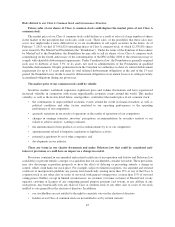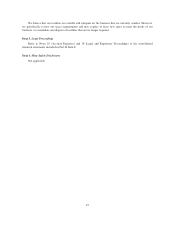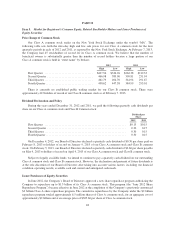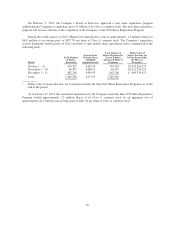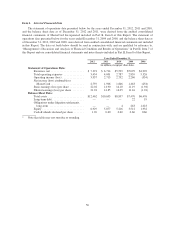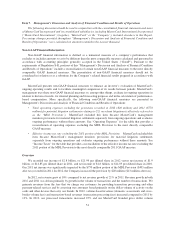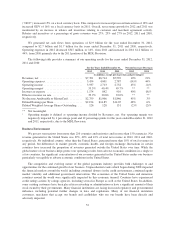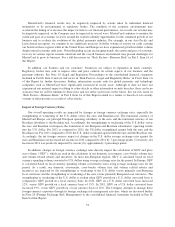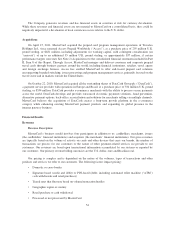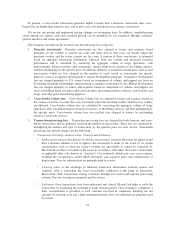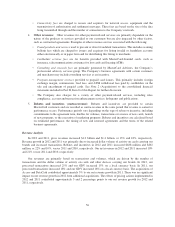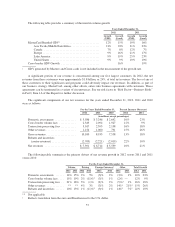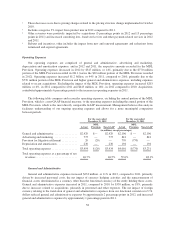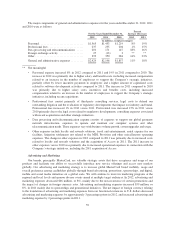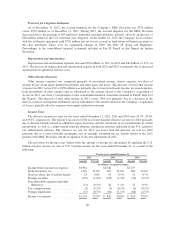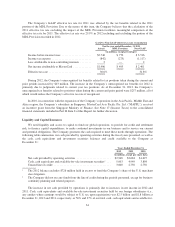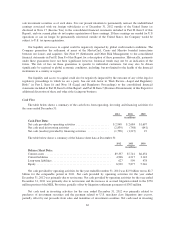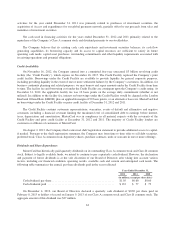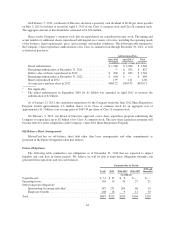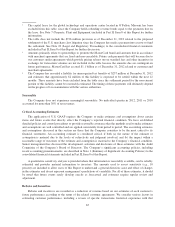MasterCard 2012 Annual Report Download - page 59
Download and view the complete annual report
Please find page 59 of the 2012 MasterCard annual report below. You can navigate through the pages in the report by either clicking on the pages listed below, or by using the keyword search tool below to find specific information within the annual report.In general, a cross-border transaction generates higher revenue than a domestic transaction since cross-
border fees are higher than domestic fees, and in most cases also include fees for currency conversion.
We review our pricing and implement pricing changes on an ongoing basis. In addition, standard pricing
varies among our regions, and such standard pricing can be modified for our customers through customer-
specific incentive and rebate agreements.
The Company classifies its net revenues into the following five categories:
1. Domestic assessments: Domestic assessments are fees charged to issuers and acquirers based
primarily on the volume of activity on cards and other devices that carry our brands where the
merchant country and the issuer country are the same. A portion of these assessments is estimated
based on aggregate transaction information collected from our systems and projected customer
performance and is calculated by converting the aggregate volume of usage (purchases, cash
disbursements, balance transfers and convenience checks) from local currency to the billing currency
and then multiplying by the specific price. In addition, domestic assessments include items such as card
assessments, which are fees charged on the number of cards issued or assessments for specific
purposes, such as acceptance development or market development programs. Acceptance development
fees are charged primarily to U.S. issuers based on components of volume, and support our focus on
developing merchant relationships and promoting acceptance at the point of sale. Market development
fees are charged primarily to issuers and acquirers based on components of volume, and support our
focus on building brand awareness and card activation, increasing purchase volumes, cross-border card
usage, and other general marketing purposes.
2. Cross-border volume fees: Cross-border volume fees are charged to issuers and acquirers based on
the volume of activity on cards that carry our brands where the merchant country and the issuer country
are different. Cross-border volume fees are calculated by converting the aggregate volume of usage
(purchases and cash disbursements) from local currency to the billing currency and then multiplying by
the specific price. Cross-border volume fees also include fees charged to issuers for performing
currency conversion services.
3. Transaction processing fees: Transaction processing fees are charged for both domestic and cross-
border transactions and are primarily based on the number of transactions. These fees are calculated by
multiplying the number and type of transactions by the specific price for each service. Transaction
processing fees include charges for the following:
•Transaction Switching—Authorization, Clearing and Settlement.
OAuthorization refers to the process by which a transaction is routed to the issuer for approval and
then a decision whether or not to approve the transaction is made by the issuer or, in certain
circumstances such as when the issuer’s systems are unavailable or cannot be contacted, by
MasterCard or others on behalf of the issuer in accordance with either the issuer’s instructions
or applicable rules (also known as “stand-in”). Our standards, which may vary across regions,
establish the circumstances under which merchants and acquirers must seek authorization of
transactions. Fees for authorization are primarily paid by issuers.
OClearing refers to the exchange of financial transaction information between issuers and
acquirers after a transaction has been successfully conducted at the point of interaction.
MasterCard clears transactions among customers through our central and regional processing
systems. Fees for clearing are primarily paid by issuers.
OSettlement. Once transactions have been authorized and cleared, MasterCard helps to settle the
transactions by facilitating the exchange of funds between parties. Once clearing is completed, a
daily reconciliation is provided to each customer involved in settlement, detailing the net
amounts by clearing cycle and a final settlement position. Fees for settlement are primarily paid
by issuers.
55


